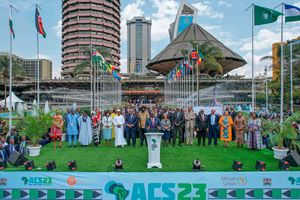Oil and gas companies rallied to align by net zero goal

Dr Sultan Al Jaber COP28 President addressing Delegates at Kenyatta international convention Centre on September 5,2023 during the Africa climate summit. PHOTO|SILA KIPLAGAT
What you need to know:
- COP28 President-designate Sultan Al Jaber has called upon the oil and gas industry to intensify their efforts towards addressing the biggest climate and energy challenges the world faces today.
- Al Jaber told the ADIPEC delegates about his determination to slash global emissions by almost half by 2027 in a bid to cap global warming at 1.5C
COP28 President-designate Sultan Al Jaber has called upon the oil and gas industry to intensify their efforts towards addressing the biggest climate and energy challenges the world faces today.
Al Jaber was speaking during the 39th edition of the world’s largest energy exhibition and conference, Abu Dhabi International Petroleum Exhibition and Conference (ADIPEC), held in United Arab Emirates this week.
In his keynote address, Al Jaber reiterated calls to the industry to step up and align around net zero by 2050, zero-out methane emissions and eliminate routine flaring by 2030. He acknowledged the efforts of more oil and gas companies to decarbonise, including international ones, and rallied key players in the oil and gas industry to be central in climate change solutions.
More than 20 oil and gas companies have positively answered calls to align around net zero by 2050.
Describing the progress, Al Jaber said, “This took time, effort and many months of hard work, negotiation and collaboration.” Al Jaber called for a reimagination of the relationship between producers and the heaviest-consuming countries and sectors, highlighting ongoing efforts to accelerate decarbonisation.
Al Jaber's address comes at a critical juncture, with less than two months remaining before the United Arab Emirates (UAE) hosts COP28, where global leaders will converge to assess their commitments to climate goals.
As mandated by the Paris Climate Agreement, COP28 UAE will deliver the first ever Global Stocktake – a comprehensive evaluation of progress against climate goals and encourage countries to take ambitious climate actions that keep warming below 1.5 degrees Celsius. The stocktake takes place every five years.
“As the UAE prepares to welcome global leaders to COP28 in November 2023, ADIPEC will help frame diverse conversations that complement the nation's goal of delivering a COP of collaborative action, while driving investment into the clean energies of the future.
“I urge everyone to make this commitment at COP28, a COP where I am calling on everyone to set the highest ambitions, follow through with practical actions and deliver real results,” he said.
COP28, he emphasised, must be the “turning point where we begin to get back on track and start sprint to 2030”. “Nobody has all the answers but working together we can lay a solid foundation for a climate positive, economically sustainable future.”
Al Jaber told the ADIPEC delegates about his determination to slash global emissions by almost half by 2027 in a bid to cap global warming at 1.5C. The Intergovernmental Panel on Climate Change has calculated that the world must reduce emissions by at least 43 per cent over the next seven years to keep the 1.5C within reach. “And we must do this while also ensuring human prosperity by meeting the energy needs of the planet’s growing population,” he said.
Al Jaber said the phase-down of fossil fuels is inevitable and essential but acknowledged the need for a " comprehensive energy transition plan that is fair, fast, just, equitable and responsible."
The monumental challenge, Al Jaber noted, revolves around replacing or decarbonising the equivalent of 250 million barrels of oil, gas and coal consumed daily. “This, however, presents a historic opportunity for growth and innovation, with clean tech investments reaching record highs and renewable energy capacity set to triple to 11,000 GW by 2030,” he said.
Describing the necessary actions, Al Jaber highlighted three priority areas—curbing emissions from the production of energy, scaling up renewables and decarbonising hard-to-abate sectors such as steel cement, aluminium and heavy transportation. He stressed the significance of eliminating methane leaks and flaring as the fastest way to impact operational emissions.
As COP28 approaches, countries remain divided between those demanding to phase out fossil fuels and those insisting on preserving a role for coal, oil and natural gas.
The COP28 president also outlined his vision to reimagine the relationship between producers and the heaviest consuming countries and sectors. “Since March, I have been convening heavy emitting sectors alongside the energy industry, governments, civil society, NGOs, scientists, technologists and the financial community to accelerate decarbonisation.”
Al Jaber added that governments should play a proactive role in setting demand signals and addressing permitting issues. “Together, we must overcome the hurdles to scale up and commercialise hydrogen and carbon capture technologies.”





